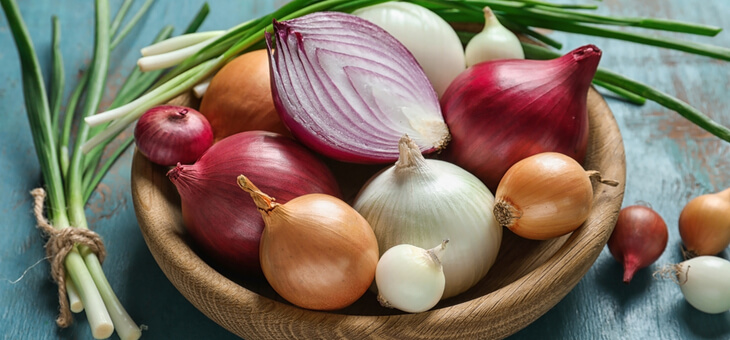The bulbous onion and its numerous relatives belong to the lily family. Some of these alliums are distinctly ornamental; a few others, notably garlic, leek, brown onion, and chive, are common vegetables.
Onions are an essential ingredient in hundreds of dishes, from cuisines all across the world. You’re probably used to starting many recipes by chopping an onion. They add a subtle but delicious flavour and come with a whole host of health benefits.
Onions are packed with nutrients
Onions are low in calories but packed full of vitamins and minerals.
They’re particularly high in vitamin C, a nutrient involved in regulating immune health, collagen production, tissue repair and iron absorption.
One medium onion has about 8 per cent of your recommended daily intake of pyridoxine (vitamin B6). They’re also rich in folate (vitamin B9)
B vitamins play key roles in metabolism, red blood cell production and nerve function.
Lastly, they’re a good source of potassium, the third most abundant mineral in the body. Potassium helps the body regulate fluid, send nerve signals and regulate muscle contractions.
Read: Five nutrients for healthy ageing
May improve heart health
Onions contain antioxidants and compounds that fight inflammation, decrease triglycerides and reduce cholesterol levels – all of which may lower heart disease risk.
One of the flavonoids in onions, quercetin, is a potent anti-inflammatory and it may help decrease heart disease risk factors, such as high blood pressure.
Evidence from animal studies supports that onion consumption may reduce risk factors for heart disease, including inflammation, high triglyceride levels and blood clot formation.
High in fibre
Onions contain two kinds of fibre: dietary and prebiotic. They are particularly rich in the non-digestible type of fibre that the beneficial bacteria in our gut use as fuel. They feed on this prebiotic fibre and create short-chain fatty acids. Research has shown that these short-chain fatty acids strengthen gut health, boost immunity, reduce inflammation and enhance digestion.
Fibre also helps you feel full for longer and help keep your bowel movements regular.
High in antioxidants
Onions are loaded with plant chemicals including flavonoids, which have both an antioxidant and anti-inflammatory effect. When consumed regularly and in sufficient quantity, these compounds may help protect against chronic conditions such as cancer and diabetes. In fact, onions contain over 25 different flavonoids and are one of the richest sources in our diets.
Red onions, in particular, contain anthocyanins – special plant pigments in the flavonoid family that give red onions their deep colour.
Multiple population studies have found that people who consume more foods rich in anthocyanins have a reduced risk of heart disease.
Vitamin C also acts as a powerful antioxidant in your body, protecting your cells against damage caused by unstable molecules called free radicals.
Read: Signs you are low on vitamin C
May boost bone density
When you think of bone health, you probably think about dairy products. However, many other foods, including onions, may help support strong bones.
A study in 24 middle-aged and postmenopausal women showed that those who consumed 3.4 ounces (100 ml) of onion juice daily for eight weeks had improved bone mineral density and antioxidant activity compared to a control group.
Another study in 507 perimenopausal and postmenopausal women found that those who ate onions at least once a day had a 5 per cent greater overall bone density than individuals who ate them once a month or less.
May be good for gut health
Allium vegetables contain prebiotics: compounds that feed the microorganisms in fermented foods (otherwise known as probiotics) and help maintain a healthy gut biome.
A 2018 research review found that prebiotic fibre, found in garlic and onions, may be even better for your gut than the fibre in some fruits, vegetables and whole grains.
Consuming foods rich in prebiotics helps increase probiotics, such as Lactobacillus and bifidobacterial strains, which benefit digestive health.
While onions are generally good for gut health, some people are sensitive to them.
Read: Nine powerhouse vegies you should be eating
Be aware of digestive issues
Some people may experience digestive issues, including heartburn, bloating and excessive gas when they consume onions. This is often due to the fact they contain fermentable oligosaccharides, disaccharides, monosaccharides, and polyols (FODMAPs).
FODMAPs are a type of carbohydrate and fibre that some people find their digestive system cannot tolerate.
Eating lots of them can cause gastrointestinal distress for people with sensitive GI tracts or conditions such as irritable bowel syndrome. Even garlic and onion powder may cause these reactions.
Do you eat onions often? Do you find they irritate your stomach? Share your favourite way to get more onions into your diet in the comments section below.
If you enjoy our content, don’t keep it to yourself. Share our free eNews with your friends and encourage them to sign up.
Disclaimer:This article contains general information about health issues and is not advice. For health advice, consult your medical practitioner.

